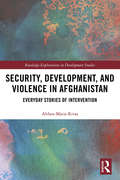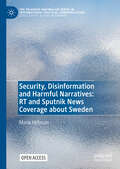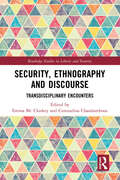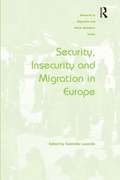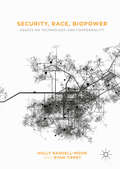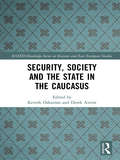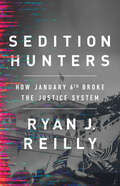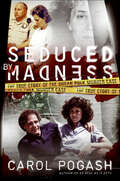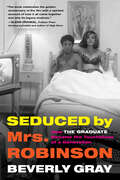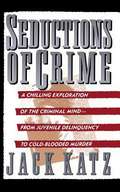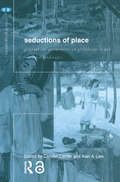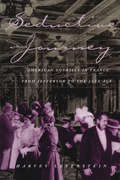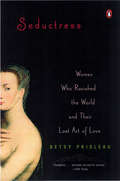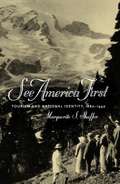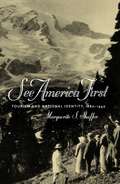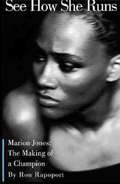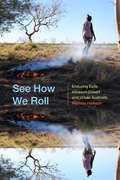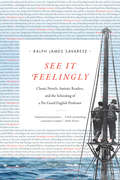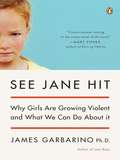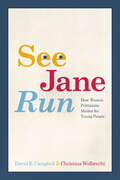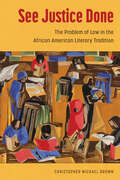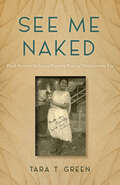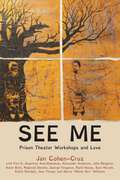- Table View
- List View
Security, Development, and Violence in Afghanistan: Everyday Stories of Intervention (Routledge Explorations in Development Studies)
by Althea-Maria RivasSecurity, Development, and Violence in Afghanistan provides a unique insight into the lived realities of the international intervention in Afghanistan and highlights the diversity, relationships, and interdependence of various groups including both external actors and Afghan communities. Analysis of the international intervention in Afghanistan following the post 9/11 invasion in 2001, one of the largest and most expensive in history, tends to focus on the perspective of organisational dynamics and policies or external actors. Drawing on the author’s five years of experience living, researching and working in Afghanistan, this book uses ethnographic methodologies to explore the micro-level interactions between different actors, showing how communities, local leaders, aid workers, UN officials, military and others navigated shifting security, development, and conflict dynamics. Starting with a contextual introduction to the intervention and the key debates surrounding it, this book goes on to explore the stories of security, development, and violence as constructed through official policy discourse, and then through the lived experiences of interveners and local actors. The book weaves a compelling narrative which links local and global issues and focuses on the everyday practices, relationships and acts of resistance which take place in two provinces of Afghanistan. Finally, the author highlights what this book’s findings mean both for what we know about Afghanistan and for how we understand international interventions and the everyday dynamics between actors who live and work in spaces of conflict. Security, Development, and Violence in Afghanistan: Everyday Stories of Intervention will be of considerable interest to scholars and professionals with an interest in Afghanistan, aid work, humanitarian intervention, development studies, and peace and conflict studies.
Security, Disinformation and Harmful Narratives: RT and Sputnik News Coverage about Sweden (The Palgrave Macmillan Series in International Political Communication)
by Maria HellmanIt is a well-known fact both among scholars of propaganda and disinformation, and among political leaders that Sputnik and RT are using their news coverage for disinformation purposes to harm Western and European societies. Following the Russian invasion of Ukraine, which enhanced the security threat by disinformation, the EU decided to ban these two media. Against this backdrop, the study asks what the disinformation about Sweden in Sputnik and RT looked like prior to the ban (It should be noted that both channels still publish news for a European audience by way of VPN and other pathways.) It is done by way of a narrative approach, which means that the analyses seek to trace what stories that were told and how. The study thus analyzes the narrative logic of propaganda and disinformation narratives promulgated by Russian state-sponsored media platforms Sputnik and RT, and aim to show how these media have sought to denigrate Sweden. This is an open access book.
Security, Ethnography and Discourse: Transdisciplinary Encounters (Routledge Studies in Liberty and Security)
by Emma Mc CluskeyThis interdisciplinary book analyses different contexts where security concerns have an impact on institutional or everyday practices and routines in the lives of ordinary people. Creating a dialogue between the fields of International Relations, Peace and Conflict Studies, Sociolinguistics, Education and Anthropology, this book addresses core themes associated with conflict and security – peacebuilding, refugee settlement, nationalism, surveillance and sousveillance – and examines them as they manifest in everyday spaces and practices. Seven empirical studies are presented that bring ethnographic and/or close-up interactional lenses to practices of security in schools, refugee centres, care homes, city streets and roadsides. Drawing on fieldwork and data from Cyprus, Bosnia-Herzegovina, Sweden, Germany and the US, the chapters explore what notions of suspicion, peace, conflict and threat mean and how they are manifested in people’s lived experiences. This book will be of much interest to students of Critical Security Studies, Anthropology, Sociology, Sociolinguistics and International Relations in general.
Security, Insecurity and Migration in Europe (Research In Migration And Ethnic Relations Ser.)
by Gabriella LazaridisHaving often been framed in terms of security concerns, migration issues have simultaneously given rise to issues of insecurity: on the one hand, security of borders, political, societal and economic security/insecurity in the host country; on the other, social, legal and economic concerns about human security, with regard to both EU citizens and migrants entering Europe. In terms of state security, migration is a core target of increasingly globally networked surveillance capabilities, whilst with respect to human security, it exposes the gap between the protections that migrants formally enjoy under international law and the realities they experience as they travel and work across different countries. Drawing on the latest research from across the EU, Security, Insecurity and Migration explores the concerns of states with regard to migration and the need to protect the fundamental rights of migrants. An interdisciplinary examination of the issues of security and insecurity raised by migration for states, their citizens and migrants themselves, this book will be of interest to scholars of politics, sociology and geography researching migration, race and ethnicity, human and state security and EU politics and policy.
Security, Race, Biopower
by Holly Randell-Moon Ryan TippetThis book explores how technologies of media, medicine, law and governance enable and constrain the mobility of bodies within geographies of space and race. Each chapter describes and critiques the ways in which contemporary technologies produce citizens according to their statistical risk or value in an atmosphere of generalised security, both in relation to categories of race, and within the new possibilities for locating and managing bodies in space. The topics covered include: drone warfare, the global distribution of HIV-prevention drugs, racial profiling in airports, Indigenous sovereignty, consumer lifestyle apps and their ecological and labour costs, and anti-aging therapies. Security, Race, Biopower makes innovative contributions to multiple disciplines and identifies emerging social and political concerns with security, race and risk that invite further scholarly attention. It will be of great interest to scholars and students in disciplinary fields including Media and Communication, Geography, Science and Technology Studies, Political Science and Sociology.
Security, Society and the State in the Caucasus (BASEES/Routledge Series on Russian and East European Studies)
by Kevork Oskanian Derek AverreThe Caucasus, including the South Caucasus states and Russia’s North Caucasus, continues to be an area of instability and conflict. This book, based on extensive original research, explores in detail at both the local and regional level the interaction between state and society and the impact of external actors' engagement in the region within a conceptual framework linking security and democracy. Unlike other books on the subject, which tend to examine the issues from a Western political science perspective, this book incorporates insights from sociology, geography and anthropology as well as politics and contains contributions from scholars who have carried out extensive research in the region within a European Commission-funded Seventh Framework Programme project.
Sedition Hunters: How January 6th Broke the Justice System
by Ryan J. ReillyThe January 6th attack is an unprecedented crime in American history. Sprawling and openly political, it can't be handled by the traditional rules and norms of law enforcement--threatening the very idea of justice and its role in society. The attack on the Capitol building following the 2020 election was an extraordinarily large and brazen crime. Conspiracies were formed on social media in full public view, the law-breakers paraded on national television with undisguised faces, and with outgoing President Donald Trump openly cheering them on. The basic concept of law enforcement--investigators find criminals and serve justice--quickly breaks down in the face of such an event. The system has been strained by the sheer volume of criminals and the widespread perception that what they did wasn't wrong. A mass of online tipsters--"sedition hunters"--have mobilized, simultaneously providing the FBI with valuable intelligence and creating an ethical dilemma. Who gets to serve justice? How can law enforcement still function as a pillar of civil society? As the foundations of our government are questioned, the FBI and Department of Justice are the first responders to a crisis of democracy and law that threatens to spread, and fast. In this work of extraordinary reportage, Ryan Reilly gets to know would-be revolutionaries, obsessive online sleuths, and FBI agents, and shines a light on a justice system that's straining to maintain order in our polarized country. From the moment the police barriers were breached on January 6th, 2021, Americans knew something had profoundly changed. Sedition Hunters is the fascinating, high-stakes story of what happens next.
Seduced by Madness: The True Story of the Susan Polk Murder Case
by Carol PogashA true crime account and analysis of a California housewife’s murder of her husband and the revealing trial that followed.In October 2002, Susan Polk, the soft-spoken mother of three teenage boys, was arrested for stabbing her husband and former therapist, Dr. Felix Polk, to death. Three years later she was tried for first degree murder, choosing to act as her own attorney in a trial that rapidly devolved into one of the most outrageous media circuses in modern history. To a crowded courtroom, Susan Polk presented her defense—a bizarre story of unethical therapies, abuse, repressed memories, and satanic rituals—and, in doing so, exposed her madness. Carol Pogash was there.Seduced by Madness is the remarkably compelling, profoundly disturbing true story of the severe dysfunction of an affluent American family, as told by the leading journalist who worked the case. It is a spellbinding re-creation of a troubled life, a marriage, a murder, and a terrifying, inexorable descent into madness.Praise for Seduced by Madness“While the background is fascinating, the coverage of the trial is mesmerizing. Pogash takes the characters . . . and creates an edge-of-your-seat excitement. For fans of true crime, psychology, courtroom drama and truth-is-stranger-than fiction, this is a triumph.” —Publishers Weekly (starred review)
Seduced by Mrs. Robinson: How "The Graduate" Became the Touchstone of a Generation
by Beverly Gray*An Amazon Best Book of the Month* “[Gray] writes smartly and insightfully . . . The book as a whole offers a fascinating look at how this movie tells a timeless story.” —The Washington PostMrs. Robinson, you’re trying to seduce me. Aren’t you? When The Graduate premiered in December 1967, its filmmakers had only modest expectations for what seemed to be a small, sexy art-house comedy adapted from an obscure first novel by an eccentric twenty-four-year-old. There was little indication that this offbeat story—a young man just out of college has an affair with one of his parents’ friends and then runs off with her daughter—would turn out to be a monster hit, with an extended run in theaters and seven Academy Award nominations. The film catapulted an unknown actor, Dustin Hoffman, to stardom with a role that is now permanently engraved in our collective memory. While turning the word plastics into shorthand for soulless work and a corporate, consumer culture, The Graduate sparked a national debate about what was starting to be called “the generation gap.” Now, in time for this iconic film’s fiftieth birthday, author Beverly Gray offers up a smart close reading of the film itself as well as vivid, never-before-revealed details from behind the scenes of the production—including all the drama and decision-making of the cast and crew. For movie buffs and pop culture fanatics, Seduced by Mrs. Robinson brings to light The Graduate’s huge influence on the future of filmmaking. And it explores how this unconventional movie rocked the late-sixties world, both reflecting and changing the era’s views of sex, work, and marriage.
Seduction: A History From The Enlightenment To The Present
by Clement KnoxA brilliantly original history that explores the shifting cultural mores of courtship, told through the lives of remarkable women and men throughout history. If sex has generally been a private matter, seduction has always been of intense public interest. Whether the stuff of front-page tabloid news, the scandal of nineteenth-century American courts, or the stuff of literature across the eras, we are fascinated by stories of seduction and sex. In the first history of its kind, Clement Knox explores seduction in all its historical and cultural incarnations. Moving from the Garden of Eden to the carnivals of eighteenth-century Venice, and from the bawdy world of Georgian London to the saloons and speakeasies of the Jazz Age, this is an exploration of timeless themes of power, desire, and free will. Along the way we meet Mary Wollstonecraft, her daughter Mary Shelley, and her friend Caroline Norton, and reckon with their fight for women’s rights and freedoms. We encounter Jack Johnson, the first black heavyweight champion of the world, who became entangled in America's labyrinthine and racialized seduction laws. We discover how tall tales of predatory vampires, hypnotists, and immigrants were mobilized by Nazis and nativists to help propel them to power. We consider how after seduction seemingly vanished from view during the Sexual Revolution, it exploded back into our lives as The Game became a multi-million bestseller, online dating swept the world, and the ongoing male fascinating with manipulating women was exposed. In a big-thinking cultural history told through an extraordinary range of stories and sources, Knox explores how our ideas about desire and pursuit have developed in step with the modern world. This is a bold, modern charter of seduction, from the birth of the Enlightenment to the explosion of romantic literature and right up to our contemporary moments of reckoning around “incel” culture and #MeToo.
Seductions of Crime: Moral and Sensual Attractions in Doing Evil
by Jack KatzIn this startling look at evil behavior, a UCLA sociologist tries to get inside the criminal psyche to understand what it means or feels, signifies, sounds, tastes, or looks like to do any particular crime.
Seductions of Place: Geographical Perspectives on Globalization and Touristed Landscapes (Critical Geographies #Vol. 19)
by Alan A LewThe seductiveness of touristed landscapes is simultaneously local and global, as travelled places are formed and reworked by the activities of diverse, mobile people, in their desires to experience situated, sensuous qualities of difference. Cartier and Lew’s interesting and informative book explores contemporary issues in travel and tourism and human geography, and the complex cultural, political, and economic activities at stake in touristed landscapes as a result of globalization. This book assesses travel and tourism as simultaneously cultural and economic processes, through ideas about place seduction and the formation of landscapes. Throughout, examples are given from urban and environmental touristed landscapes, from major world cities to tropical islands, and chapter contributions include: an analysis of the representational character of landscape and the built environment historic constructions of place seduction the importance of class, racial, and gender dimensions of place how mobility and the seduction of place orient identity formation the environmental impacts of tourism economies. Broad in scope, this book is ideal for social scientists and humanists who are interested in contemporary debates about place studies, mobility, and the located realities of globalization.
Seductive Journey: American Tourists in France from Jefferson to the Jazz Age
by Harvey LevensteinFor centuries, France has cast an extraordinary spell on travelers. Harvey Levenstein's Seductive Journey explains why so many Americans have visited it, and tells, in colorful detail, what they did when they got there. The result is a highly entertaining examination of the transformation of American attitudes toward French food, sex, and culture, as well as an absorbing exploration of changing notions of class, gender, race, and nationality. Levenstein begins in 1786, when Thomas Jefferson instructed young upper-class American men to travel overseas for self-improvement rather than debauchery. Inspired by these sentiments, many men crossed the Atlantic to develop "taste" and refinement. However, the introduction of the transatlantic steamship in the mid-nineteenth century opened France to people further down the class ladder. As the upper class distanced themselves from the lower-class travelers, tourism in search of culture gave way to the tourism of "conspicuous leisure," sex, and sensuality. Cultural tourism became identified with social-climbing upper-middle-class women. In the 1920s, prohibition in America and a new middle class intent on "having fun" helped make drunken sprees in Paris more enticing than trudging through the Louvre. Bitter outbursts of French anti-Americanism failed to jolt the American ideal of a sensual, happy-go-lucky France, full of joie de vivre. It remained Americans' favorite overseas destination. From Fragonard to foie gras, the delicious details of this story of how American visitors to France responded to changing notions of leisure and blazed the trail for modern mass tourism makes for delightful, thought-provoking reading. ". . . a thoroughly readable and highly likable book. "—Deirdre Blair, New York Times Book Review
Seductive Spirits: Deliverance, Demons, and Sexual Worldmaking in Ghanaian Pentecostalism (Spiritual Phenomena)
by Nathanael HomewoodPentecostalism, Africa's fastest-growing form of Christianity, has long been preoccupied with the business of banishing demons from human bodies. Among Ghanaian Pentecostals, deliverance is primary among the embodied, experiential gifts—a loud, messy, and noisy experience that ends only when the possessed body falls to the ground silent and docile, the evil spirits rendered powerless in the face of the holy spirit-wielding-prophets. And nowhere is Ghanaian Pentecostal obsession with demons more pronounced than with sexual demons. In this book, Nathanael Homewood examines the frequent and varied experiences of spirit possession and sex with demons that constitute a vital part of Pentecostal deliverance ministries, offering insight into these practices assembled from long-term ethnographic engagement with four churches in Accra, the capital of Ghana. Relying on the uniqueness of the Pentecostal sensorium, this book unravels how spirits and sexuality intimately combine to expand the definition of the body beyond its fleshy boundaries. Demons are a knowledge regime, one that shapes how Pentecostals think about, engage with, and construct the cosmos. Deliverance Pentecostals reiterate and tarry with the demonic, especially sexually, as a realm of invention whereby alternative ways of being, sensing, and having sex are dreamed, practiced, and performed. Ultimately, Homewood argues for a distinction between colonial demonization and decolonial demons, charting another path to understanding being, the body, and sexualities.
Seductress: Women Who Ravished the World and Their Lost Art of Love
by Elizabeth PrioleauIn this road map to restoring feminine sexual power, Betsy Prioleau introduces and analyzes the stories and stratagems of history?s greatest seductresses. These are the women who ravished the world?from such classic figures as Cleopatra and Mae West to such lesser-known women as the infamous Violet Gordon Woodhouse, who lived in a ménage with four men. Smarts, imagination, courage, and killer charm helped these love maestras claim the men of their choice and keep them fascinated for life. Through an exposé of their secrets, Seductress provides an authoritative, empowering guide to erotic sovereignty.
See America First: Tourism and National Identity, 1880-1940
by Marguerite S. ShafferMarguerite Shaffer chronicles the birth of modern American tourism between 1880 and 1940, linking tourism to the simultaneous growth of national transportation systems, print media, a national market, and a middle class with money and time to spend on leisure.
See America First: Tourism and National Identity, 1880-1940
by Marguerite ShafferIn See America First, Marguerite Shaffer chronicles the birth of modern American tourism between 1880 and 1940, linking tourism to the simultaneous growth of national transportation systems, print media, a national market, and a middle class with money and time to spend on leisure. Focusing on the See America First slogan and idea employed at different times by railroads, guidebook publishers, Western boosters, and Good Roads advocates, she describes both the modern marketing strategies used to promote tourism and the messages of patriotism and loyalty embedded in the tourist experience. She shows how tourists as consumers participated in the search for a national identity that could assuage their anxieties about American society and culture.Generously illustrated with images from advertisements, guidebooks, and travelogues, See America First demonstrates that the promotion of tourist landscapes and the consumption of tourist experiences were central to the development of an American identity.
See How She Runs: Marion Jones and the Making of a Champion
by Ron RapoportShe has been called "the next great sports superstar. " She's a world-champion sprinter and a national-champion basketball player. She has been considered the next great hope for American track and field since she was fourteen. At sixteen, she made the U. S. Olympic team. Nike has created a shoe for her, Annie Leibovitz has photographed her, and the world is watching to see if she'll be the first person ever to win five gold medals in track at the Olympics. Marion Jones is faster than any woman alive, but where did she come from and where is she going? Ron Rapoport's biography of the woman the New York Times called "the most prominent track athlete on the planet" is a remarkable profile of a woman not at the end of her athletic career, but at the beginning. It's the story of a season at the highest level of sport, and the triumphs and tragedies of Jones's quest to win four gold medals at the 1999 World Championships, the gateway to the 2000 Olympics in Sydney. Her story is also that of an American girl born into a society just beginning to make room for women on its playing fields. She played baseball, basketball. She ran. She grew tall and beautiful and strong. She led he college basketball team to a national championship. But it was running that she loved; she could run faster than anyone. Rapoport follows Jones from meet to meet during the 1999 outdoor track season, a witness to her domination. With unprecedented access to Jones, her colleagues, family, friends and foes, Rapoport artfully presents the stories of a world-class athlete whose quest began as the dream of a little girl.
See How We Roll: Enduring Exile between Desert and Urban Australia (Global Insecurities)
by Melinda HinksonIn See How We Roll Melinda Hinkson follows the experiences of Nungarrayi, a Warlpiri woman from the Central Australian desert, as she struggles to establish a new life for herself in the city of Adelaide. Banished from her hometown, Nungarrayi energetically navigates promises of transformation as well as sedimented racialized expectations on the urban streets. Drawing on a decades-long friendship, Hinkson explores these circumstances through Nungarrayi's relationships: those between her country and kin that sustain and confound life beyond the desert, those that regulate her marginalized citizenship, and the new friendships called out by displacement and metropolitan life. An intimate ethnography, See How We Roll provides great insight into the enduring violence of the settler colonial state while illuminating the efforts of Indigenous people to create lives of dignity and shared purpose in the face of turbulence, grief, and tightening governmental controls.
See It Feelingly: Classic Novels, Autistic Readers, and the Schooling of a No-Good English Professor (Thought in the Act)
by Ralph James Savarese“We each have Skype accounts and use them to discuss [Moby-Dick] face to face. Once a week, we spread the worded whale out in front of us; we dissect its head, eyes, and bones, careful not to hurt or kill it. The Professor and I are not whale hunters. We are not letting the whale die. We are shaping it, letting it swim through the Web with a new and polished look.”—Tito Mukhopadhyay Since the 1940s researchers have been repeating claims about autistic people's limited ability to understand language, to partake in imaginative play, and to generate the complex theory of mind necessary to appreciate literature. In See It Feelingly Ralph James Savarese, an English professor whose son is one of the first nonspeaking autistics to graduate from college, challenges this view. Discussing fictional works over a period of years with readers from across the autism spectrum, Savarese was stunned by the readers' ability to expand his understanding of texts he knew intimately. Their startling insights emerged not only from the way their different bodies and brains lined up with a story but also from their experiences of stigma and exclusion. For Mukhopadhyay Moby-Dick is an allegory of revenge against autism, the frantic quest for a cure. The white whale represents the autist's baffling, because wordless, immersion in the sensory. Computer programmer and cyberpunk author Dora Raymaker skewers the empathetic failings of the bounty hunters in Philip K. Dick's Do Androids Dream of Electric Sheep? Autistics, some studies suggest, offer instruction in embracing the nonhuman. Encountering a short story about a lonely marine biologist in Antarctica, Temple Grandin remembers her past with an uncharacteristic emotional intensity, and she reminds the reader of the myriad ways in which people can relate to fiction. Why must there be a norm? Mixing memoir with current research in autism and cognitive literary studies, Savarese celebrates how literature springs to life through the contrasting responses of unique individuals, while helping people both on and off the spectrum to engage more richly with the world.
See Jane Hit
by James GarbarinoFrom one of America's leading authorities on juvenile violence comes a groundbreaking investigation of the explosion of violent behavior in girls With Lost Boys, James Garbarino became our foremost explicator of violent behavior in boys. Now he turns his attention to its increasing incidence in girls. Twenty-five years ago, ten boys were arrested for assault for every one girl. Now that ratio is four-to-one and dropping. Combining clinical experience with incisive analyses of social trends, Garbarino traces the factors--many of them essentially positive--behind the epidemic: girls' increased participation in sports and greater comfort with their physicality, but also their lack of training in handling aggression. See Jane Hit goes beyond diagnosing the problem to outline a clear-eyed, compassionate solution.
See Jane Run: How Women Politicians Matter for Young People
by David E. Campbell Christina WolbrechtThe definitive analysis of how the presence of women politicians affects young people. From Kamala Harris to Nikki Haley, women in public life are widely expected to inspire young people, especially girls, to follow in their footsteps. See Jane Run provides the definitive analysis of women politicians as role models. With wide-ranging data and attention to gender, race, and party, David E. Campbell and Christina Wolbrecht find that women in politics help convince young people, regardless of gender, that women are capable of political leadership. For young women, women role models enhance faith in democracy and inspire political engagement, including running for office themselves. As role models, women politicians help ensure a more inclusive democracy.
See Justice Done: The Problem of Law in the African American Literary Tradition (Margaret Walker Alexander Series in African American Studies)
by Christopher Michael BrownIn See Justice Done: The Problem of Law in the African American Literary Tradition, author Christopher Michael Brown argues that African American literature has profound and deliberate legal roots. Tracing this throughline from the eighteenth century to the present, Brown demonstrates that engaging with legal culture in its many forms—including its conventions, paradoxes, and contradictions—is paramount to understanding Black writing.Brown begins by examining petitions submitted by free and enslaved Blacks to colonial and early republic legislatures. A virtually unexplored archive, these petitions aimed to demonstrate the autonomy and competence of their authors. Brown also examines early slave autobiographies such as Olaudah Equiano’s Interesting Narrative and Mary Prince’s History, which were both written in the form of legal petitions. These works invoke scenes of Black competence and of Black madness, repeatedly and simultaneously.Early Black writings reflect how a Black Atlantic world, organized by slavery, refused to acknowledge Black competence. By including scenes of Black madness, these narratives critique the violence of the law and predict the failure of future legal counterparts, such as Plessy v. Ferguson, to remedy injustice. Later chapters examine the works of more contemporary writers, such as Sutton E. Griggs, George Schuyler, Toni Morrison, and Edward P. Jones, and explore varied topics from American exceptionalism to the legal trope of "colorblindness." In chronicling these interactions with jurisprudential logics, See Justice Done reveals the tensions between US law and Black experiences of both its possibilities and its perils.
See Me Naked: Black Women Defining Pleasure in the Interwar Era
by Tara T. GreenPleasure refers to the freedom to pursue a desire, deliberately sought in order to satisfy the self. Putting pleasure first is liberating. During their extraordinary lives, Lena Horne, Moms Mabley, Yolande DuBois, and Memphis Minnie enjoyed pleasure as they gave pleasure to both those in their lives and to the public at large. They were Black women who, despite their public profiles, whether through Black society or through the world of entertainment, discovered ways to enjoy pleasure.They left home, undertook careers they loved, and did what they wanted, despite perhaps not meeting the standards for respectability in the interwar era. See Me Naked looks at these women as representative of other Black women of the time, who were watched, criticized, and judged by their families, peers, and, in some cases, the government, yet still managed to enjoy themselves. Among the voyeurs of Black women was Langston Hughes, whose novel Not Without Laughter was clearly a work of fiction inspired by women he observed in public and knew personally, including Black clubwomen, blues performers, and his mother. How did these complicated women wrest loose from the voyeurs to define their own sense of themselves? At very young ages, they found and celebrated aspects of themselves. Using examples from these women’s lives, Green explores their challenges and achievements.
See Me: Prison Theater Workshops and Love
by Jan Cohen-CruzEncounters, transformations, and reflections from in-prison and post-release theater workshopsSee Me is a collection of intimate dialogues about collective experiences in the context of prison theater workshops. Each essay is a collaboration between two or three people who connected profoundly in the temporary community that a workshop can create. Part I is an exchange grounded in the prison theater workshop between the author and one of the incarcerated participants. They alternately tell the story of what they found in the workshop, each other, the future they imagined together, and the social turmoil and utopian aspirations of the times. Part II consists of essays jointly written by eight other people impacted by close relationships spawned in diverse in-prison and re-entry theater workshops.
